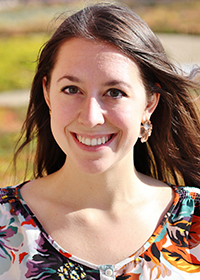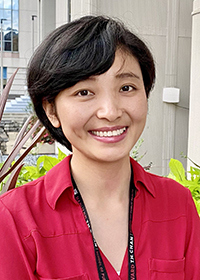Annapolis, MD; August 17, 2021—The Entomological Society of America congratulates the winners of its 2021 awards. The awards recognize scientists, educators, and students who have distinguished themselves through their contributions to entomology. Winners will be honored during Entomology 2021, ESA's Annual Meeting, taking place in-person and online, October 31 – November 3, in Denver, Colorado.
The following individuals are winners of the 2021 ESA professional, early career professional, and student awards.
Professional Awards
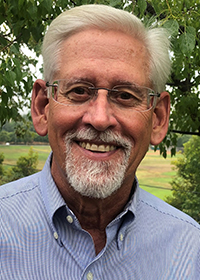 Thomas Perring
Thomas Perring
University of California, Riverside
This award, which is sponsored by Syngenta Crop Protection, recognizes outstanding contributions that have a direct relation to integrated pest management (IPM).
Dr. Thomas Perring is a professor in the Department of Entomology at the University of California, Riverside (UCR), where he has been on faculty since 1983. He received his B.S. in wildlife ecology from Oklahoma State University and M.S. and Ph.D. degrees in entomology from Texas Tech and the University of Nebraska, respectively. Perring's research has developed management options for growers of 20 cropping systems involving 17 pests and five pathosystems. His lab has provided information on three predatory insects, four predatory mites, 12 parasitoids, and two entomopathogenic fungi in support of biological control. This research has resulted in 154 reviewed articles and chapters and five edited books.
Notable areas with an integrated pest management (IPM) focus include creating a multistate partnership to develop IPM strategies for the stink bug, Bagrada hilaris; spearheading a classical BC program against the mealybug, Maconellicoccus hirsutus, and describing a new parasitoid, Anagyrus callidus (Triapitsyn, Andreason, and Perring); conducting studies that launched a worldwide investigation into whether Bemisia tabaci consists of biotypes or species (currently at least 40 species are recognized); and implementing biocontrol of date mite and mating disruption of carob moth in dates.
Perring teaches various courses and has received awards on the UCR campus and in the Pacific Branch. He served on the Pacific Branch in operations, programs, Student Paper Competition, and Linnaean Games (chair), and on national committees (Nominations Committee of Section C), and he was chair of Subsection Cc and Section C. He co-founded the ESA band, the Stridulators, which performed at national meetings in 2008 and 2010. Perring is past editor of Journal of Economic Entomology and Journal of Acarology and current editor for the Annals of Applied Biology and Insects. At UCR, Perring has been associate dean, associate vice provost, and director of university honors, and he has served for many years as the entomology undergraduate and graduate advisor. He also is the current vice chair of the department.
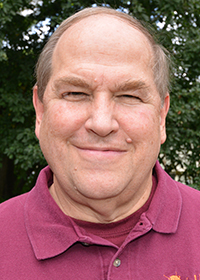
Virginia Tech
This annual award recognizes outstanding contributions to extension entomology.
Dr. Mike Weaver is a professor emeritus at Virginia Tech. He was trained at Virginia Tech (Ph.D.), West Virginia University (M.S.), and Edinboro University of Pennsylvania. Weaver served on the Virginia Tech faculty in entomology and extension for 40 years. Before his recent retirement, he led Virginia Tech pesticide programs. That group of eight faculty and staff manage a statewide extension program in pesticide safety education, youth science literacy education, and integrated pest management.
Weaver's career highlights include president of the American Association of Pesticide Safety Educators (AAPSE); AAPSE Fellow; editor-in-chief of the Journal of Pesticide Safety Education; distinguished achievement awards in extension (Entomological Society of America); Commonwealth of Virginia award for 22 years of outstanding service to the Virginia Pesticide Control Board; service awards from AAPSE, USDA, and Virginia Tech; university emeritus status from the Virginia Tech Board of Visitors; AAPSE Life Member Award; team awards for youth outreach and leadership of the Hokie BugFest; Virginia Tech Andy Swiger Land Grant Award; Virginia Tech Extension Excellence Award; and multiple other awards in extension, service, and technology. Weaver served as principal investigator of more than $15 million in grants and contracts in extension programming. His extension program earned outstanding impact evaluations by multiple peer departmental review committees. In 2011, he originated two massive annual departmental outreach events, Hokie BugFest and Hokie BugCamp, attracting over 10,000 attendees in 2019. Through his research and outreach efforts, Weaver restored the legacy of Virginia Tech's first entomologist, William Bradford Alwood.
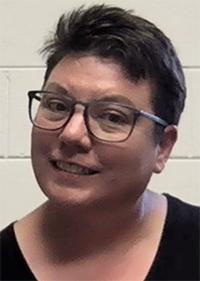 Rebecca Barr Simmons
Rebecca Barr Simmons
University of North Dakota
This award is presented annually to the member of the Society deemed to be the most outstanding teacher of the year.
Dr. Rebecca (Becky) Barr Simmons is a professor of biology at the University of North Dakota (UND). She earned her B.S. in biology from Bridgewater College in Virginia and her M.S. in biology from Wake Forest University. She then earned her Ph.D. in entomology from the University of Minnesota, studying the phylogeny and evolution of mimicry in tiger moths. She was a collaborative postdoctoral researcher with USDA/ARS/Systematics Entomology Laboratory and the Department of Entomology at the National Museum of Natural History. She is a research associate of the National Museum of Natural History, Smithsonian Institution, and the McGuire Center for Lepidoptera and Biodiversity, Florida Museum of Natural History. As a faculty member at UND, Simmons has taught large enrollment courses in general biology and evolution, as well as more advanced courses, such as entomology and senior capstone seminar. Simmons employs a flipped classroom, student-centered approach, where students work together on tasks that achieve learning objectives. Simmons is also the educational coordinator and co-principal investigator on the NSF-funded U.S. MASTER scholarship program that seeks to develop science identity in talented students from underrepresented groups in STEM. Simmons mentors these students through a seminar course that spans STEM disciplines that includes professional development activities and through individualized advising to help students pursue careers in research. She is also a UND diversity ambassador, charged with increasing diversity among faculty hires and creating an inclusive environment across the campus community. Simmons is the 2020 SysEB president and a member of the Entomology Games Committee.
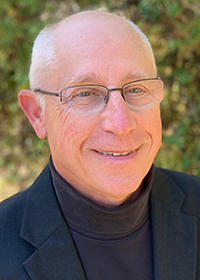 Thomas C. Sparks
Thomas C. Sparks
Corteva Agriscience
Each year this award is given to an ESA member who is able to demonstrate through his or her projects or accomplishments an ability to identify problems and develop creative, alternative solutions that significantly impact entomology.
Dr. Thomas C. Sparks is a retired research fellow at Corteva Agriscience. He received his B.A. in biology from California State University, Fresno, and his Ph.D.in entomology (1978) in insect physiology and toxicology from University of California, Riverside, under Dr. Bruce Hammock. From 1978 to 1989, Sparks was a professor in the Department of Entomology at Louisiana State University, conducting research and teaching courses in insecticide biochemistry and resistance. In 1989, Sparks left academia to explore insecticide discovery at Eli Lilly and Co., which became DowElanco, Dow AgroSciences, and now Corteva. Sparks spent 30 years in the discovery and development of new crop protection compounds for insect management, including the development of the natural product insecticide, spinosad (launched in 1997). Employing AI-based structure-activity analysis, Sparks was a co-inventor of the next-generation spinosyn insecticide, spinetoram (launched in 2007). Both spinosad and spinetoram received the Presidential EPA Green Chemistry Award (1999, 2008). Sparks was also involved in numerous other discovery projects, including the sulfoximines, which gave rise to sulfoxaflor (launched in 2013), and the recent successful design of synthetic spinosyn mimics. Externally, Sparks was active in the Insecticide Resistance Action Committee (2007-2019), serving five years as chair of the Mode of Action Group. Sparks retired from Corteva in 2019 and is now an independent consultant at Agrilucent LLC, continuing to write and consult, and remains active in ESA (46-year member) and the American Chemical Society (ACS). He has received other awards from ESA (Fellow, PBT Recognition Award), ACS Agro Division (International Award, Innovation Award), and R&D Magazine (2009 Scientist of the Year). Sparks has published 157 referred journal articles/book chapters (plus 31 others) and is a co-inventor on 47 patents.
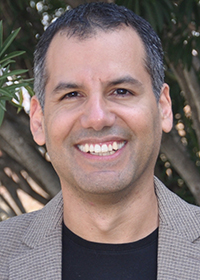 Raúl F. Medina
Raúl F. Medina
Texas A&M University
This award honors a member or member's team for creating and promoting a diverse and welcoming environment for entomologists in their university, place of employment, or community.
Dr. Raúl F. Medina is a professor in the Department of Entomology at Texas A&M University (TAMU). His laboratory conducts research aimed at understanding the modulation of species interactions among parasites and their hosts as a result of population genetics and evolutionary factors. He is also interested in understanding the factors that modulate public perception of novel biotechnology products in agriculture. Medina was appointed by the U.S. National Academies of Sciences, Engineering, and Medicine to co-author the 2017 report on "Preparing for Future Products of Biotechnology." He is currently serving as an ELSI advisor to the U.S. Department of Defense Advanced Research Projects Agency, as a content advisor to the Foundation for the National Institutes of Health Gene Convene Virtual Institute, and as a research fellow of the Institute for Science, Technology, and Public Policy at the Bush School of Government and Public Service at Texas A&M University. Medina has worked for several years to help increase awareness of diversity and inclusion in academia. He is a current member of the TAMU Diversity Science Research Cluster and a recipient of the TAMU Dean's Outstanding Achievement Award for Excellence in Diversity. He served as a member of the Diversity and Inclusion Committee for the Entomological Society of America in 2017, and as a mentor for the Ecological Society of America Diversity program from 2008 to 2018.
- (1st Place) DIFFERENT: Social-Emotional Learning Using Arthropods, Kristie Reddick and Jessica Honaker ("The Bug Chicks")
- (Runner-Up) BugScope: A Weekly Insect-Themed Live Broadcast, Isa S. Betancourt
This award honors impactful and innovative communication projects or programs that engage diverse public audiences with entomology-related scientific information.
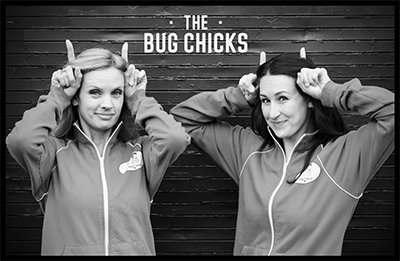 DIFFERENT: Social-Emotional Learning Using Arthropods
DIFFERENT: Social-Emotional Learning Using Arthropods
Kristie Reddick and Jessica Honaker ("The Bug Chicks")
Kristie Reddick and Jessica Honaker are "The Bug Chicks," entomologists and educators who teach about the fascinating world of arthropods. Through videos, digital media, and in-person teaching, they inspire people to open their minds and learn about these often-maligned animals. Their signature style blends science education with social-emotional learning and uses bugs as a vehicle to talk about concepts like recognizing implicit biases, prejudice, growth-mindset, and empowerment. Their new curriculum, "DIFFERENT," is the first of its kind to blend STEM and SEL; it asks students and teachers to challenge their perceptions of themselves, others, and the natural world. This evidence-based, standards-linked program is being taught in schools all over the country and is available for licensing.
As scicomm professionals, Reddick and Honaker get to work with some amazing organizations—including the U.S. Forest Service, Norman Borlaug Institute, Celestron, Microsoft, Nike, and more—to create fun, accurate science media. One of their favorite weeks of the year is spent with high schoolers in the Peruvian Amazon Rainforest, helping students understand the process of scientific research while spreading the message that different isn't bad—in fact, it's to be celebrated.
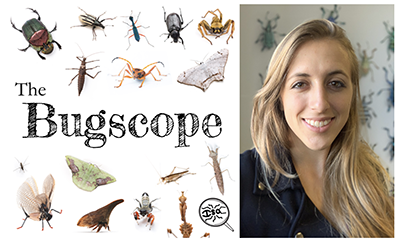 BugScope: A Weekly Insect-Themed Live Broadcast
BugScope: A Weekly Insect-Themed Live Broadcast
Isa S. Betancourt
The BugScope is a free, weekly livestream that brings audiences closer to the wonderful world of insects and spiders. The entomology-themed livestream creates a respectful, accessible online community space where insect knowledge, thoughts, and stories are exchanged between the viewers and hosts in a lighthearted but still accurate way. In turn, the BugScope aims to support biological literacy and respect for insect science and wildlife.
Since its founding in 2017, BugScope has produced over 380 episodes, 270 hours of live content, 13,250 organic followers, and an average of 1,777 unique live views per episode. The highest viewed episode, which focused on Polyphemus caterpillars, reached 36,000 live viewers. BugScope episodes have reached all different types of people and families in nearly all continents. Viewer diversity and contributions to the conversations enrich the environment in the broadcasts.
During each BugScope, founder and host Isa S. Betancourt (@isabetabug) takes viewers on virtual field trips to look at live insects or museum specimens under a dissection scope for a magnified view. The audience learns about everything from natural history, behavior, taxonomy, physiology, and morphology, to insect news. Other BugScope shows welcome entomologists at all different experience levels or involve singing homegrown insect-themed lyrics to Christmas carols. Most recently, Betancourt and Dr. Sebastian Echeverri began co-hosting a monthly happy hour show called "Sips and Spiders With Sebastian and Solange," which covers all things spiders.
Visit the BugScope's homepage at www.thebugandthebeetle.net/bugscope and tune in every Thursday at 3 p.m. ET on www.happs.tv/isabetabug.
Early Career Professional (ECP) Awards
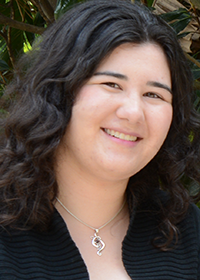 Isobel Ronai
Isobel Ronai
University of Sydney
This grant provides research funds to postdoctoral ESA members who have at least one year of promising work experience, are undertaking research in selected areas, and have demonstrated a high level of scholarship.
Dr. Isobel Ronai's research interests are in ticks and tick-borne diseases of medical and veterinary importance. She is currently a co-investigator on a research project at the University of Sydney, Australia, investigating a major tick-borne disease of livestock caused by the tick species Haemaphysalis longicornis. Ronai is also collaborating with University of Georgia researchers on tick genomic projects. Since 2016 she has held ESA leadership roles and is currently the elected Early Career Professionals representative on the International Branch Governing Board.
Previously, Ronai was awarded an Endeavour Postdoctoral Research Fellowship at Columbia University, where she led projects on the genetics and behavior of two key tick species associated with tick-borne diseases in the United States, Ixodes scapularis and Haemaphysalis longicornis. She was also a visiting postdoctoral research fellow in the laboratory group that has developed genome editing for ticks at the University of Nevada, Reno.
Ronai completed her award-winning Ph.D. in genetics and entomology at The University of Sydney in 2017. Her Ph.D. research was recognized with three ESA awards: John Henry Comstock Graduate Student Award (International Branch); Lillian and Alex Feir Graduate Student Award; and Graduate Student Award (International Branch). In addition, she was awarded the Jabez King Heydon Memorial Prize for the most meritorious biological sciences Ph.D. thesis by the University of Sydney and the Phil Carne Prize for most meritorious Ph.D. research by the Australian Entomological Society.
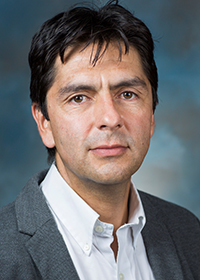 Daniel Carrillo
Daniel Carrillo
University of Florida
This award honors young professionals working within the field of entomology who have demonstrated innovation through contributions within any area of specialization (research, teaching, extension, product development, public service, etc.).
Dr. Daniel Carrillo is an associate professor of entomology at the University of Florida, located at the Tropical Research and Education Center in Homestead, Florida. He specializes in tropical fruit entomology and acarology and has a particular interest in the ecology and management of invasive arthropods, focusing on vectors of plant pathogens. His extension and research efforts aim at increasing the implementation of integrated pest management programs in tropical fruit systems.
Carrillo has a significant project on ambrosia beetles that vector the pathogen that causes laurel wilt, a new disease that has decimated native trees in the Lauraceae throughout the southeastern United States. One of his most recent and significant contributions has been discovering an unprecedented case of lateral transfer of the laurel wilt pathogen among native and exotic ambrosia beetles. He discovered that native beetles have the potential to vector laurel wilt. This discovery is fundamental to a proper understanding of ambrosia beetle-fungus symbiosis, to the epidemiology of laurel wilt in avocados, and to improving the outcome of pest management programs. He also has a significant project on biological control of acarine pests and an important publication record in leading acarological journals. He served as the senior editor of the book Prospects for Biological Control of Plant Feeding Mites and Other Harmful Organisms, published by Springer. He also serves as a member of the Florida Administrative Avocado Committee and has been an associate editor of the Florida Entomologist since 2011. Carrillo served as the president of the Acarological Society of America in 2017-2018.
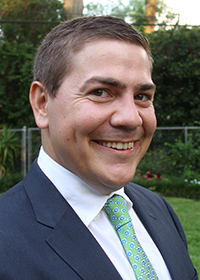 Blake E. Wilson
Blake E. Wilson
Louisiana State University
This award is given to a student transition or early professional who excels in entomological extension.
Dr. Blake E. Wilson is an assistant professor and extension specialist with the Louisiana State University (LSU) AgCenter. He leads a field crops entomology research and extension program focused on integrated pest management of rice and sugarcane insects. He received his B.S. (biology), M.S. (entomology/experimental statistics), and Ph.D. (entomology) from LSU before joining the faculty in 2017.
His extension activities aim to promote sustainable integrated pest management (IPM) strategies that maximize grower profitability. These include pheromone-based scouting methods and targeted insecticide applications. He has developed cultivar-specific management guides based on pest susceptibility and yield loss relationships. He also works to monitor invasive species expansion and raise awareness about the arrival of new insect threats. He works closely with producers and crop consultants to conduct on-farm trials demonstrating new pest management strategies.
His research focuses on host plant resistance, yield loss relationships, and sampling strategies of key insect pests. He also studies invasive species ecology and biological control.
Wilson has been active in ESA throughout his career. He participated frequently in the Entomology Games and Student Debate as a graduate student and now serves as the faculty advisor for LSU's teams. He is a previous recipient of the Kirby Hays M.S. Student Award and the John H. Comstock Ph.D. Student Award from the Southeastern Branch of ESA. He currently resides in Baton Rouge with his wife and two daughters. Geaux Tigers!
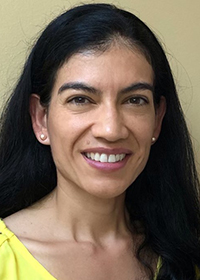 Flor Acevedo
Flor Acevedo
Penn State University
This award recognizes a student transition or early professional who has made outstanding research contributions to the field of entomology.
Dr. Flor Acevedo is an assistant professor of entomology at Penn State University. Her research centers on understanding basic mechanisms mediating plant-insect interactions, with the goal of enhancing host plant resistance. Currently, her research program uses insect pests of grapevines as a model system for various projects that include: the identification of herbivore offense mechanisms in native and invasive pests of grape; the characterization of plant resistance traits to insect herbivores; the use of biostimulants in plant protection; the identification and rearing of natural enemies from native herbivore pests; and the use of technological tools to improve pest monitoring and tracking.
Acevedo obtained her bachelor's degree in agronomy from the University of Caldas (Colombia) and her Ph.D. in entomology from Penn State University. During her 15 years of research experience, she has been involved in basic and applied research, making significant contributions to insect-plant interactions, chemical ecology, integrated pest management, insect biological control, and the general biology of insects. In addition to research, Acevedo is involved in extension and teaching.
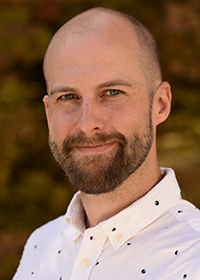 Jacob Wenger
Jacob Wenger
California State University, Fresno
This award is given to a student transition or early professional who excels in entomological education.
Dr. Jacob Wenger is an assistant professor in the Department of Plant Science at California State University, Fresno. He received his bachelor's degree in biology and environmental science from Manchester University and completed his Ph.D. in entomology at The Ohio State University under the direction of Dr. Andy Michel. While at Ohio State, Wenger studied soybean aphid evolution and served as a National Science Foundation teaching fellow in local high schools.
As the resident entomologist in an agriculture college, Wenger's curriculum emphasizes the applied skills and critical thinking required of agricultural entomologists to make sound pest management decisions. His courses combine agricultural information technology and project-based learning in the field to expose students to real world pest management scenarios where they must consider field data, costs, and sustainability when making treatment decisions. In his time at Fresno State, Wenger has expanded the entomological curriculum and has introduced new courses in apiculture and agricultural biotechnology. Additionally, he is actively developing online international integrated pest management curriculum for the country of Georgia to aid in the nation's efforts toward phytosanitary reform. Outside the classroom, Wenger mentors undergraduate and graduate student research targeting sustainable management of almond and pistachio pests. He also serves as advisor to the Fresno State Plant Science Club and regularly engages with the public through outreach events.
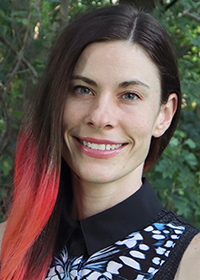
Texas A&M University
This award recognizes a student transition or early professional who has made outstanding research contributions to the field of entomology.
Joanie King is a Ph.D. candidate at Texas A&M University (TAMU) in College Station, Texas. Her dissertation research involves investigating interactions of fire ant decapitating flies (Pseudacteon curvatus) and red imported fire ants (Solenopsis invicta) and how the flies manipulate their hosts at a molecular level. In addition, King researches how to plan effective science outreach and science communication (scicomm), particularly by using front-end surveys to identify and gain valuable insight into an audience's experiences, knowledge, motivations for learning, and/or concerns. She earned her B.Sc. in biology from the University of Central Florida (UCF) and her M.Sc. in entomology from the University of Georgia (UGA).
King has been involved in many forms of outreach and continues to develop her methodology. Her outreach journey began while she was an undergraduate at UCF. While she attended UGA, she joined the social media scicomm and outreach project, Ask an Entomologist, alongside Nancy Miorelli and Joe Ballenger. In addition to social media outreach experience, King has hundreds of hours of hands-on science outreach experience with a range of diverse audiences. During her time at TAMU, she has volunteered for many events through the Entomology Graduate Student Organization (EGSO) and Aggie Women in Entomology. King also served as the community outreach coordinator for the EGSO for two years. Today, she continues to participate and perform research in scicomm and science outreach.
ESA Certification Corporation Awards
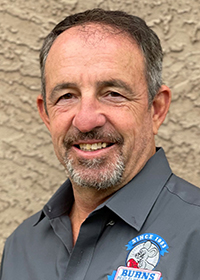 Jeffrey Keller, ACE
Jeffrey Keller, ACE
Burns Pest Elimination
This award recognizes superior contributions of an Associate Certified Entomologist in the field of structural pest management.
Jeffrey Keller is the technical director (ACE certified) of Burns Pest Elimination, located in the Phoenix, Arizona, metropolitan area, with branches in Mesa, Arizona; Tucson, Arizona; and Las Vegas, Nevada. He has been actively involved in the pest control industry for 20 years and has dedicated much of his professional life to assisting others and problem solving within that discipline. His time at Burns Pest Elimination as a technical director has seen him, with the assistance of his management team, oversee the development of more than 150 highly skilled and professional PMPs. He believes strongly in the importance of education and "leading by example." His has acquired more than eight licenses and certificates over the last 20 years. This guiding philosophy yields a multitude of benefits for those around him, including the customers at his company.
Keller has many years of involvement in the Arizona State Pest Association Board of Directors. He currently serves as vice chair the NPMA PestVets Council, assisting transitioning military service members into the pest control industry, given his extensive military career within the U.S. Army (retired). He served in several deployments and was honored with various distinguished awards and commendations.
Keller believes that individual value is greatly increased when you surround yourself with dedicated individuals who share a similar perspective for personal development of skills, knowledge, and pursuit of education. In his personal life, he enjoys time with his family, which includes his wife, two daughters, and five adventurous young grandchildren.
 Sylvia Kenmuir, BCE
Sylvia Kenmuir, BCE
BASF
This award encourages, recognizes, and rewards outstanding contributions to the ESA Certification Program and the professionalism of entomology.
Sylvia Kenmuir, M.Sc., BCE, is the Western technical representative for BASF. She has been a Board Certified Entomologist since 2012. Prior to BASF, Kenmuir was the technical director for a distributor, and her role included developing training materials on topics including entomology and certification. Because Kenmuir identified with struggling students studying and passing the Associate Certified Entomology exam, she created the "Ace the ACE" course, a 10-week webinar. The latest addition to the ACE training is a free podcast to help reinforce challenging topics covered in the exam for technicians to listen to on-the-go.
Kenmuir's involvement with industry and her community is diverse in nature. She has been featured on local TV as an industry expert on various insect pests and has participated in primary school programs on insects. She also has exemplified the importance of stepping up and getting involved. She has held chair positions for the Pest Control Operators of California, has served as past certification chair for ESA, and is a member of the NPMA Diversity Committee, to name a few.
In addition, she has made valuable contributions to the academic and scientific community by consulting and collaborating on numerous research studies with the University of California and other research universities. She was also an adjunct professor teaching integrated pest management at Long Beach City College.
Kenmuir recently returned to earn an M.Sc. in entomology from the University of Nebraska Lincoln. Her final project was the creation of a study resource for the Public Health Entomology exam.
ESA Student Awards
- Lidya Chala, Southern University
- Lilly Elliott-Vidaurri, University of Texas Rio Grande Valley
- Axel David Gonzalez Murillo, Tennessee State University
This grant honors students currently enrolled at Historically Black Colleges and Universities (HBCUs) and other Minority-Serving Institutions (MSI), to promote interest in entomology and to stimulate interest in attending the ESA Annual Meeting.
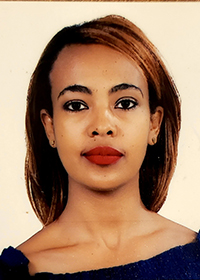 Lidya Chala
Lidya Chala
Southern University
Lidya Chala received her B.S. degree in plant science from College of Agriculture at Hawassa University, Ethiopia, in 2007. Selected as an outstanding female student, Chala was awarded a scholarship to pursue a master's degree at the same university. Her thesis research involved the study of tortoise beetles in the genus Aspidomorpha, detrimental pests of sweet potato. Soon after graduation, Chala was hired as the project coordinator of the biological control program of Parthenium hysterophorus as part of an international team led by Virginia State University. This position provided the opportunity to advance her career, gaining leadership experience by coordinating research activities, rearing and releasing biocontrol agents, and training students and foreign visitors during on-site demonstrations. She was responsible for conducting host range testing of a stem-boring weevil (Listronotus setosipennis), which led to the issue of release permit by the Ethiopian government.
Chala decided to expand her career and pursue a second M.S. degree in agriculture at the Department of Vegetable Crop Production at Hebrew University of Jerusalem, Israel, in 2019. By obtaining two M.S. degrees, she was able to gain expertise in plant science, entomology, and pest management. As she navigated through graduate school, Chala became passionate about continuing her career as an entomologist in the United States. In spring 2021, she was admitted to the Ph.D program at the Department of Urban Forestry and Natural Resources, Southern University, in Baton Rouge, Louisiana. She joined the Entomology Lab under the advisement of Dr. Veronica Manrique.
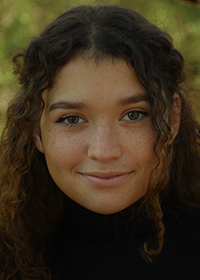
University of Texas Rio Grande Valley
Lilly Elliott-Vidaurri graduated in 2020 from the University of Texas Rio Grande Valley (UTRGV) with a bachelor's degree in environmental science, concentration in environmental biology. She has experience working as a student research assistant in the Soil Ecology Lab at UTRGV from the fall of 2018 to the fall of 2019. There, she ran gravimetric moisture assessments, created interpolation maps on ArcMap, and conducted soil DNA extractions. From spring to summer of 2020, she conducted a cafeteria study with urbanized harvester ants on campus, where she collected data to use for her thesis. Fall of 2020, Elliott-Vidaurri was accepted into the Agricultural, Environmental, and Sustainability Sciences Program at UTRGV, where she is working alongside Dr. Robin Choudhury, her committee chair, and Dr. Hannah Penn, an entomologist from the USDA, to learn more about seed preferences and potential recommendations to local farmers.
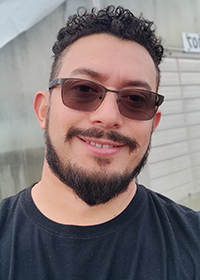 Axel David Gonzalez Murillo
Axel David Gonzalez Murillo
Tennessee State University
Axel David Gonzalez Murillo is from Honduras, a country where agriculture supports a majority of the population. He graduated with an agronomist degree from the Universidad Nacional de Agricultura (Catacamas, Olancho, Honduras) in 2011. Upon his graduation, he worked for an international developmental aid program in the northeast of Honduras, which was co-sponsored by the Saint Michael Church in Cary, North Carolina, and North Carolina State University (NCSU). Serving as the project coordinator and interacting with professors and alumni of NCSU inspired him to consider graduate school in the United States.
In 2011, he spent three months at NCSU, working on his thesis as a requirement for his bachelor's degree. His research evaluated the effects on nutrition and health of the pollinator Bombus impatiens. In 2015, he returned to the United States to work as a research intern at the Department of Entomology at NCSU until 2018. During that time, as was responsible for maintaining research insect colonies as well as collecting field data of Kudzu bug (Megacopta cribraria) on soybean plants. His love for insects grew, and working with them became his passion. In 2019, he joined Tennessee State University to complete a master's degree under the supervision of Dr. Karla Addesso at the Otis L. Floyd Nursery Research Center, McMinnville, Tennessee.
He is currently completing research on management of the flatheaded appletree borer using winter cover crops as well as evaluating the impact of cover crops on ornamental tree health and arthropod populations. One of the major problems with flatheaded borers in woody ornamentals is the lack of information on how to control the beetles without pesticide applications that ultimately represent a high impact on the environment. He previously presented research showing that winter cover crops can be used in place of systemic imidacloprid treatments to reduce flatheaded borer damage in nursery trees.
After completing his master's degree in summer 2021, he will begin pursuing a Ph.D. in crop science at the University of Tennessee and continue his work on flatheaded borers. He will expand his field ecology skills by investigating the phylogenetic relationships within the Chrysobothris femorata species complex and aiding in the development of new molecular tools for identification of these closely related species by nontaxonomic experts.
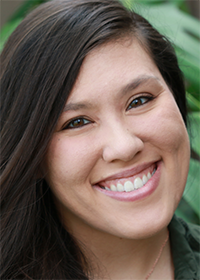 Johnalyn Gordon
Johnalyn Gordon
University of Kentucky
This ESA award, sponsored by Corteva, recognizes Dr. Larry Larson's role as a leader and pioneer in insect management and carries that legacy to the next generation of leaders in applied entomology.
Johnalyn Gordon is a Ph.D. student at the University of Kentucky, under the direction of Dr. Zachary DeVries. Her research examines the impact of both bed bugs and cockroaches on human health, with specific focus on quantifying histamine from dust in bed bug-infested homes, assessing how indoor environmental factors influence cockroach allergen load, and applying knowledge of pest biology to improve pest management and insect allergen mitigation strategies in disadvantaged communities.
While pursuing her B.S. in wildlife ecology and conservation at the University of Florida, Gordon worked as an undergraduate research technician in the Urban Entomology Lab, developing and conducting industry research projects under the direction of Dr. Phil Koehler. This sparked her interest in urban pests and their impact on people's quality of life and led her to continue at the University of Florida and complete her M.S. in entomology. Her M.S. research, under the direction of Dr. Thomas Chouvenc, focused on the biology and management of subterranean termites, specifically the role of cuticular hydrocarbons in nestmate recognition and the identification of a proportional feeding threshold for chitin synthesis inhibitor baits used for colony elimination.
Gordon is honored to be a recipient of this award and would like to thank ESA and Corteva for their support. She is excited to continue developing as both an urban entomologist and a scientist during her doctoral degree and aims to pursue a career in which she can apply her passion for addressing health risks associated with urban pests.
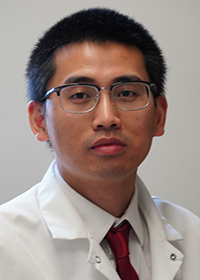 Zhilin Li
Zhilin Li
Louisiana State University
The purpose of this ESA award is to encourage graduate students working with insects or other arthropods in the broad areas of physiology, biochemistry, and molecular biology to affiliate with ESA's Integrative Physiological and Molecular Insect Systems Section and to attend the ESA Annual Meeting.
Zhilin Li received his bachelor's degree in agronomy from Northwest A&F University in 2014, where he had training in entomology and plant pathology. He joined the Insect Physiology Lab at the Department of Entomology at Louisiana State University to pursue his M.S. in 2016. His thesis was to characterize the role of potassium conductance pathways (primarily inward rectifier potassium channels) on tick salivary gland function and blood feeding. He continued with his Ph.D. program under the mentorship of Dr. Daniel Swale after he earned his M.S. in 2018. His dissertation project was to investigate the underpinning (primarily Ion homeostasis) that contributes to vector competence in mosquitoes and ticks. His degree and side projects have generated eight peer-reviewed publications, with three first-authored research articles. During the five years of his degree programs, he has won more than $7,000 in cash prizes from travel awards, presentation competitions, and awards for student academic performance.
Li is active in participating in scientific conferences and ESA activities. He has given eight presentations for either ESA or ACS annual meetings since 2016. He took part in ESA Student Debates in 2019 as a member of the LSU team and served as the LSU representative in the ESA Southeastern Branch Student Affairs Committee (2019-2020).
 Sajjan Grover
Sajjan Grover
University of Nebraska-Lincoln
Sponsored by Bayer, this award will be presented annually to recognize a student for outstanding contributions to the Society, his/her academic department, and the community, while still achieving academic excellence.
Sajjan Grover received a bachelor's degree in agriculture from Punjabi University and a master's in entomology from Punjab Agricultural University, India. He started his Ph.D. at the University of Nebraska-Lincoln (UNL) under the supervision of Dr. Joe Louis in spring 2017 and graduated in spring 2021. He is currently working as a postdoctoral research associate in the same lab. His main research interests are molecular plant-insect interactions and plant defense mechanisms to insects. Grover's Ph.D. research focuses on elucidating the sorghum defense responses to insect herbivory with an emphasis on the lignin biosynthesis pathway and major phytohormones as defense mechanisms to fall armyworm and sugarcane aphids. He is also interested in understanding the mechanisms by which insect elicitors alter the plant defense responses. He has published 10 peer-reviewed articles, and several more are in progress. Grover has participated in various outreach activities and served on several committees, including fundraising committees and outreach committees at the department level. Previously, he served as a UNL student representative, North Central Branch Student Affairs Committee. Grover has attended most of the ESA annual meetings and NCB meetings since November 2017. He has contributed to ESA by presenting his research findings in different formats, participating in the Student Debates and entomology games, organizing symposiums and events, volunteering as a judge, and serving on different committees and groups at ESA.
- Kadie Britt, University of California, Riverside (ESA Eastern Branch)
- Caleb Hubbard, University of California, Riverside (ESA Pacific Branch)
- Ramandeep Kaur Sandhi, Cornell University (ESA International Branch)
- Katie Turo, USDA NIFA (ESA North Central Branch)
- Caixing Xiong, Texas A&M University (ESA Southwestern Branch)
- Yan Yan, Harvard University (ESA Southeastern Branch)
These six awards are given to one graduate student from each ESA Branch to promote interest in entomology and to stimulate interest in attending the ESA Annual Meeting.
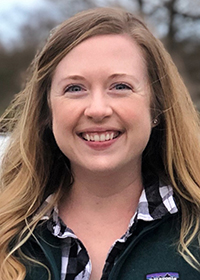 Kadie Britt
Kadie Britt
University of California, Riverside
Kadie Britt is a postdoctoral scholar working in entomology with Dr. Houston Wilson, University of California, Riverside, at the Kearney Agricultural Research Extension Center in Parlier, California. Currently, her research focuses on arthropod pest management in hemp and cannabis, management of navel orangeworm in almonds and pistachios, and monitoring and management of black fig fly in figs, with an ultimate goal of improving the sustainability of pest management in these agricultural systems. Prior to arriving in California, Britt earned her Ph.D. working with Dr. Thomas Kuhar in the Virginia Tech Department of Entomology, where her doctorate research focused on arthropod pest management in hemp. Britt has worked with growers and extension personnel in California, Virginia, and beyond to learn about and help alleviate issues faced by those growing hemp in field and indoor settings. Her passion within entomology is extension and the opportunity to work with growers.
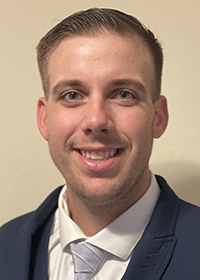 Caleb Hubbard
Caleb Hubbard
University of California, Riverside
Dr. Caleb Hubbard is a postdoctoral scholar in the Department of Entomology at the University of California, Riverside (UCR), in the lab of Dr. Amy Murillo. His exposure to entomology began at an early age, as he spent time collecting insects with his father, who was working on his master's thesis in entomology. Hubbard remembers "helping" his father collect fig beetles (Cotinus mutibilus) from local fruit trees that his father would later use in his experiments. This early exposure to entomology inspired Hubbard to pursue a career in science, though he initially was unsure of the scientific field he would enter. Before his graduate training in veterinary entomology, he worked in multiple research labs with a wide range of research disciplines. Hubbard obtained his Ph.D. in March 2021 from UCR, where he worked with Dr. Alec Gerry. His doctoral research focused on untangling the complex nature of behavioral resistance to the neonicotinoid insecticide imidacloprid in the house fly. Caleb enjoys teaching and regularly seeks opportunities to share his research through extension publications, podcasts, and outreach to diverse audiences. In winter 2021, he had the privilege of teaching an upper-division entomology course independently, which was the first time his department had hired a graduate student to serve as the sole instructor for a course. He hopes in the future to build an independent research program where he can train the next generation of scientists to have a passion for addressing complex problems in the field of veterinary entomology.
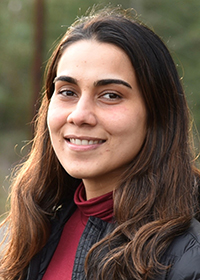 Ramandeep Kaur Sandhi
Ramandeep Kaur Sandhi
Cornell University
Dr. Ramandeep Kaur Sandhi received her Ph.D. in entomology from Montana State University in 2020 under the direction of Dr. Gadi V. P. Reddy and Dr. Michael A. Ivie. Her Ph.D. dissertation focused on exploring the potential of commercial and Montana native Entomopathogenic nematodes (EPN) against wireworm complex in Montana. She earned B.S. and M.S. degrees in entomology from Punjab Agricultural University, India. Her M.S. thesis project focused on evaluation of okra germplasm for morphological and biochemical resistance toward cotton jassid. Sandhi is currently a postdoctoral associate at Cornell University in Dr. Brian Nault's program, where she is studying biology and ecology of, and exploring different management strategies for, a new invasive pest, Allium leafminer. Additionally, she is evaluating persistent EPN species against Colorado potato beetle in potatoes. She has published 10 peer-reviewed papers (eight of which she served as first author) and six extension articles. Sandhi has been involved in ESA since 2017 by participating in oral and poster sessions, volunteering in student activities, and serving as a reviewer for ESA journals. Sandhi has represented the International Branch on the Student Affairs Committee (SAC) since 2020 and serves as vice chair of ESA SAC, promoting student members' participation in the society. She is looking forward to serving as chair of ESA SAC in 2021. She is also a member of the Diversity, Equity, and Inclusion Committee at Cornell AgriTech. Sandhi's long-term career goal is to continue research and utilize her research and leadership experience in an academic/industry position to effectively address the growing needs of farmers.
Dr. Katie Turo is a recent graduate of The Ohio State University (OSU). At OSU, Turo was funded by the National Science Foundation (NSF GRFP) and OSU's prestigious Presidential Fellowship Program. During her graduate career, Turo was awarded over $398,000 in funding, authored 11 peer-reviewed publications, and won 12 presentation awards for her effective public communication. Turo is broadly interested in reconciliation ecology and developing new land management strategies that satisfy human needs while preserving healthy ecosystem functioning. Her dissertation work focuses on cities' potential for urban pollinator conservation and how greenspace management can optimize bee biodiversity, foraging, and nesting success. Currently, Turo is a USDA NIFA postdoctoral fellow in Dr. Rachael Winfree's lab at Rutgers University, where she is developing climate resilient management for wild pollinators of spring fruit crops.
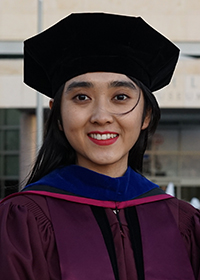
Texas A&M University
Dr. Caixing Xiong (Chase) graduated with a Ph.D. in entomology in December 2020 from Texas A&M University, supervised by Dr. Patricia Pietrantonio. Xiong obtained her M.S. from Auburn University in 2016 under Dr. Nannan Liu, and her B.S. from China Agricultural University in Beijing in 2015. She is a current postdoctoral researcher with Dr. Pietrantonio with a focus on tick neuropeptide physiology and mosquito feeding behavior. Her Ph.D. research was on vector biology, specifically molecular physiology. The focus of her dissertation was on discovering novel chemistries on important neuropeptide receptors regulating feeding and reproduction in mosquitoes and ticks as potential pest control tools. Her research resulted in four first-author peer-reviewed publications in leading journals in the field, such as Frontiers in Physiology and Pest Management Science. This latter, innovative study included a high-throughput screening pipeline in search of small molecule ligands of the kinin receptor; she is a co-inventor of a resulting patent. Xiong has been an active member of ESA since 2016; she received many awards to attend annual meetings, such as the 2020 Medical, Urban, and Veterinary Entomology (MUVE) Student Travel Award and the 2021 Acarological Society of America (ASA) Student Abstract Award. As an active advocate for Women in Science for an inclusive environment, she is a member of the Aggie Women in Entomology organization in her department and served on that governing board in 2020.
Yan Yan recently received her doctoral degree at Vanderbilt University under the mentorship of Dr. Julián Hillyer. Her dissertation focused on the physiological interaction between the immune and circulatory systems of insects. By analyzing the response to infection in insects from 16 different orders, Yan showed that the functional integration of the immune and circulatory systems is conserved throughout insect evolution. Then, Yan focused her efforts on mosquitoes that transmit disease, and uncovered that evolutionarily conserved immune signaling pathways regulate the infection-induced migration of immune cells to the mosquito heart. Yan has published nine peer-reviewed papers, five of them as the first author. She has served ESA as a symposium organizer for the 2020 Annual Meeting and as a reviewer for the Journal of Medical Entomology. She received first place in the Student Paper Competition at the 2018 and 2019 ESA annual meetings, and in 2019 she received the Lillian and Alex Feir Graduate Student Travel Award in Insect Physiology, Biochemistry, or Molecular Biology. With a passion for insect physiology and a mission of contributing to vector-control strategies, Yan is now a postdoctoral scholar at Harvard University under the mentorship of Dr. Flaminia Catteruccia. Yan's long-term goal is to further understand mosquito physiology and how it impacts malaria transmission.
CONTACT: Joe Rominiecki, jrominiecki@entsoc.org, 301-731-4535 x3009
ABOUT: ESA is the largest organization in the world serving the professional and scientific needs of entomologists and people in related disciplines. Founded in 1889, ESA today has nearly 7,000 members affiliated with educational institutions, health agencies, private industry, and government. Headquartered in Annapolis, Maryland, the Society stands ready as a non-partisan scientific and educational resource for all insect-related topics. For more information, visit www.entsoc.org.

